Current issue
Online first
Archive
About the Journal
Aims and scope
Editorial Board
International Editorial Board
List of Reviewers
Abstracting and indexing
Ethical standards and procedures
REMV in Social Media
Contact
Instructions for Authors
Instructions for Authors
Manuscript formatting template
Title page
Highlights
Payments
‘Ghostwriting’ and ‘Guestauthorship’
Guidelines for Referees
Real Estate Market Price Prediction Model of Istanbul
1
University of Warwick, United Kingdom
2
Department of Industrial Engineering, Istanbul Technical University, Turkey
Submission date: 2022-02-19
Final revision date: 2022-04-06
Acceptance date: 2022-05-05
Publication date: 2022-12-09
Corresponding author
REMV; 2022;30(4):1-16
HIGHLIGHTS
- analyze the effects of using a real and relatively large amount of data
- determine the main variables that are contributing to the evaluation of an estate
- compare different machine learning models to find the optimal one for the real estate market
- create an accurate model to predict any house in Istanbul market
KEYWORDS
TOPICS
R31 - Housing Supply and MarketsR30 - Real Estate Markets, Spatial Production Analysis, and Firm Location: General
ABSTRACT
The Turkish Housing Market has experienced a steep increase in prices. Individual and corporate investors now possess tools to estimate the real estate evaluation while using smaller amounts of data with traditional techniques. Not having an analytical approach to evaluate the price of real estate could cause the investor to lose considerable amounts of money, especially in the case of individual investors. This study aims to determine how different machine learning algorithms with real market data can improve this process.
To be able to test this, over 30000 lines of housing market data with over 13 variables is scraped. Data is cleansed, manipulated and visualized, while predictive models such as linear regression, polynomial regression, decision trees, random forests, and XGboost are created and compared according to the CRISP-DM framework. The results show that using complex techniques to create machine learning models could improve the accuracy in predicting the listing prices of houses. This paper aims to: - analyze the effects of using a real and relatively large amount of data, -determine the main variables that contribute to the evaluation of an estate, - compare different machine learning models to find the optimal one for the real estate market, - create an accurate model to predict the value of any house on the Istanbul market.
Share
RELATED ARTICLE



